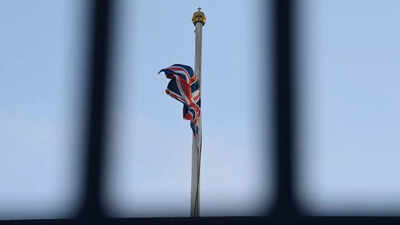Top Searches
- News
- World News
- UK News
- Outpouring of grief but also criticism of monarchy
Outpouring of grief but also criticism of monarchy

The UK flag flutters at half mast at Buckingham Palace, after Queen Elizabeth, Britain's longest-reigning monarch and the nation's figurehead for seven decades, died aged 96 (Reuters)
LONDON: She had the longest reign of any royal in British history, over 70 years, and most of the world’s populace now alive has known no other British monarch than Queen Elizabeth II. So the reactio n to her death was both global and personal, and at times, intense — including blunt anti-monarchist strains that pierced the outpouring of grief. Historian David Cannadine once said that Elizabeth’s legacy would feature both transition and decline — the change of British society into “a much more fluid, multicultural, m ore secular society,” and “the downsizing of the British Empi re into the British Commonwealth, the downsizing of Britain as a great power.”
The queen’s death provoked conflicting emotions in the Caribbean, a region shaped by the British Empire. Out of 15 sovereign states that recognised her as their head of state at the time of her death, over half were former British possessions in the Caribbean. The queen’s death reviv ed memories of the region’s difficult colonial past and the monarchy’s role in the slave trade. “We should all work towards removing the royal family as head of state of our nation s,” said David Denny, general secretary of the Caribbean Movement for Peace and Integration, from Barbados.
For Britonstoo, news of the queen’s death opened a tense divide. Julie Begum, of British and Bangladeshi heritage, said the queen “benefited from historical privileges like the empire, but there won’t be another monarch who has the same respect as she did.” She then added of the monarchy: “They should just stop it; we should be a republic.”
The queen’s death provoked conflicting emotions in the Caribbean, a region shaped by the British Empire. Out of 15 sovereign states that recognised her as their head of state at the time of her death, over half were former British possessions in the Caribbean. The queen’s death reviv ed memories of the region’s difficult colonial past and the monarchy’s role in the slave trade. “We should all work towards removing the royal family as head of state of our nation s,” said David Denny, general secretary of the Caribbean Movement for Peace and Integration, from Barbados.
For Britonstoo, news of the queen’s death opened a tense divide. Julie Begum, of British and Bangladeshi heritage, said the queen “benefited from historical privileges like the empire, but there won’t be another monarch who has the same respect as she did.” She then added of the monarchy: “They should just stop it; we should be a republic.”
FOLLOW US ON SOCIAL MEDIA
FacebookTwitterInstagramKOO APPYOUTUBE
Start a Conversation
end of article









